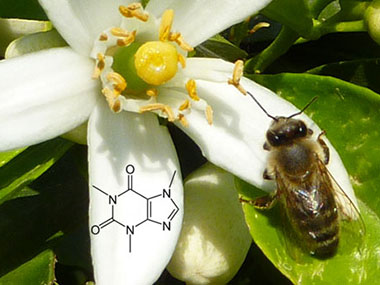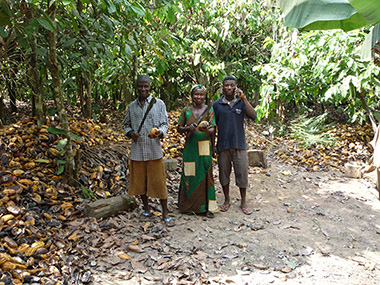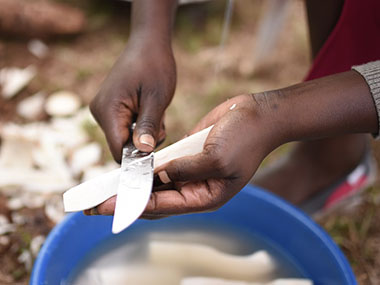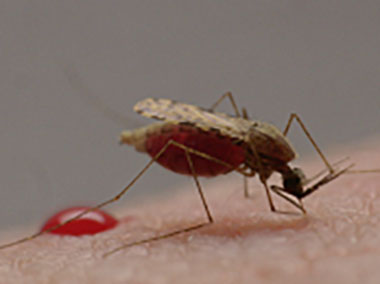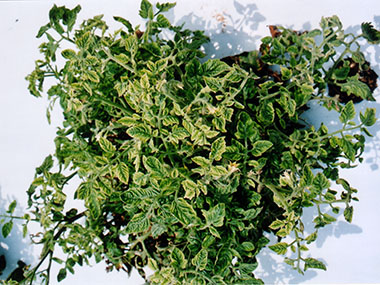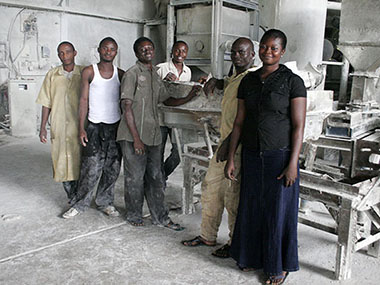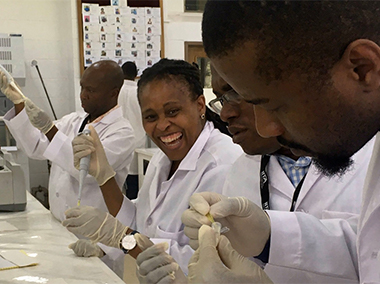Food Systems
- Paul Afolabi - Development of improved processing for village-based root and tuber processing in sub-Saharan Africa [Lead Supervisor: Keith Tomlins]
- Fredrick Agyeman – Rural finance in Ghana [Lead Supervisor: Gideon Onumah]
- Julie Crenn - Developing biofortified products to address vitamin A deficiency in Africa [Lead Supervisor: Andrew Westby]
- Maria Carcamo de la Concepcion – Molecular and physiological characterization of blueberry during storage [Lead Supervisor: Richard Colgan]
- Rania Hassan – Promoting broad-based SME development in South Africa: Role of public policy initiatives [Lead Supervisor: Gideon Onumah]
- Michael Kariuki Ndegwa - Promoting Resilience and Food Security through Weather Risk-Contingent Credit in Africa [Lead Supervisor: Apurba Shee]
- Zainab Oyetunde-Usman – The impact of intensity of adoption of agricultural technology on rural farm households’ productivity, welfare and inequality [Lead Supervisor: Apurba Shee]
- Rajib Sarker – Role of credit rating agencies in enhancing access to finance in Bangladesh [Lead Supervisor: Gideon Onumah]
FaNSI scholarships
- Daniel Mbogo – Reducing the risk of Acrylamide in processing sweet potatoes [Lead Supervisor: Richard Colgan];
- Lydia O’Meara – Compiling global lessons to improve nutrition in traditional food systems, from multi-country evidence on drivers of food choice [Lead Supervisor: Julia de Bruyn with co-supervision from Kate Wellard and Elaine Ferguson (LSHTM)];
- Bernard Gathigi Munyua – Impact and adoption of quality protein maize in Ethiopia [Lead Supervisor: Apurba Shee with co-supervision from Julia de Bruyn and Hugo de Groote];
- Hamed Johnny Sarnavi – Development of a solar-assisted off-grid retrofitted fluidized bed dryer [Lead Supervisor: Marcelo Precoppe]
FaNSI Partnership Scholarships
- Kingsley Kamtambe – Understanding the value chains and post-harvest losses and waste of small pelagic fish in Malawi [Lead Supervisor: Baqir Lalani]
- Lizzie Saka – A food systems approach to understanding and supporting contributions of small pelagic fish to human [Lead Supervisor: Julia de Bruyn with co-supervision by Shakuntala Thilsted (WorldFish) and Horace Phiri (LUANAR)]
- Asoo Yaji – Host-plant interactions (Neonectria) infection in apple as a model system [Lead Supervisor: Richard Colgan]
Recently completed PhD
- Ros Fisher – Structural and biochemical factors affecting apple response to long-term low oxygen storage [Lead Supervisor: Debbie Rees]
- Claire Coote
- Dr Julia de Bruyn
- Dr Fiorella Picchioni
- Dr Tanya E Stathers
- Dr Christopher J Turner
- Professor Andrew Westby
- Dr John E Orchard
- Dr Andy Frost
- Dr Parag Acharya
- Dr Aurélie Bechoff
- Professor Molly E Brown
- Dr Richard J. Colgan
- Julie Crenn
- Dr Paula Dominguez Salas
- Linda Nicolaides
- Dr Charoula K Nikolaou
- Dr Aditya Parmar
- Dr Marcelo Precoppe
- Dr Debbie Rees
- Dr Corinne J Rumney
- Karen Thurston
- Dr Joshua Wesana
- Dr Judy Bettridge
- Dr Louise Abayomi
Affiliates
- Richard Lamboll
- Professor Ben Bennett
- Professor Adrienne Martin
- Professor Vegard Iversen
- Professor Tilman Brück
- Dr Lora Forsythe
- Dr M. Mofakkarul Islam
- Dr Kaysara Khatun
- Associate Professor Ravinder Kumar
- Dr Tania E Martinez Cruz
- Dr Laxmi Prasad Pant
- Dr Kate Wellard
- Dr Baqir Lalani
- Dr Diego Naziri
- Dr Gideon Edu Onumah
- Dr Apurba Shee
Examples of current projects
Bill and Melinda Gates Foundation
- The APHLIS+ Project (2015-2020)
European Union
- Research on Food Fortification (2018-2022)
- Value Chains Analysis for Development - VCA4D (2016 - 2022)
Department for International Development
- Understanding Knowledge Systems and What Works to Promote Science Technology and Innovation in Kenya, Tanzania and Rwanda (2018-2020)
Consultative Group for International Agricultural Research
- Raising Incomes and Improving the Health and Safety at Small and Medium Cassava Processing Centres (CIP, 2017- 2022);
- Uptake and evaluation of innovative insurance – embedded credit for promoting resilience and livelihoods for smallholder maize farmers in Kenya (IFPRI, 2018-2022).
World Food Programme
- Preparation of Food safety and quality manual (2019-2020)
Agriculture and Horticulture Development Board (UK)
- Improving the storability of UK apples (2016 – 2021)
Innovate UK
- Coolberry – Innovations for in-field cooling of soft fruit (2019-2022)
- Design and development of direct-coupled photovoltaic powered agro-processing machinery (Agritech Catalyst 2019-2021)
Examples of completed projects
Bill and Melinda Gates Foundation
- Cassava Adding Value for Africa I and II (https://cava.nri.organd http://cava2.org/)
European Union
- Science and technology for enhancing the contribution of Tropical Root Crops to development in ACP countries. (http://projects.nri.org/tropicalroots/)
- Improving the livelihoods of smallholder cassava farmers through better access to growth markets (Cassava Gmarkets) https://cassavagmarkets.nri.org/about-the-project/work-package-descriptions/13-information/latest-news/28-new-website-launched
- The African Postharvest Losses Information System (APHLIS)
https://ec.europa.eu/jrc/en/publication/eur-scientific-and-technical-research-reports/african-postharvest-losses-information-system-aphlis - Gains from losses of root and tuber crops (GRATITUDE)
IMMANA Competitive Research Grants
- NUTRI-P-LOSS: Nutritional Postharvest Loss Estimation Methodology https://immana.lcirah.ac.uk/node/590
- Documenting seasonal variation in food resources in low-literacy settings: A study of milk consumption in Tanzania https://immana.lcirah.ac.uk/fellowships/fellowships-round-4/julia-de-bruyn
Rockefeller Foundation
- Rockefeller Cassava Innovation Challenge: NRI Cassava Bag
The Food Systems Research Group addresses challenges and opportunities relating to the spectrum of activities from food production to consumption, with a focus on low- and middle-income countries particularly in sub-Saharan Africa. Research currently undertaken by the group encompasses work on durable and perishable crops after harvest to reduce losses, enhancement of financial and/or nutritional crop value, improved storage and preservation, improving food processing technologies, ensuring food safety and quality management and, addressing food loss and waste - with the ultimate aim of improving the livelihoods and nutritional status of vulnerable populations.
The group has recently been strengthened through new members of staff recruited under the institute’s Food and Nutrition Security Initiative, FaNSI (https://www.nri.org/development-programmes/fansi/overview) enhancing our expertise in key areas such as food environments and public health nutrition and we are currently building a state of the art Food Innovation laboratory to be open later in 2020.
In addition to a programme of research overseas, the group has collaborated with NIAB EMR, a Kent based research institute with an international reputation for horticultural research, to establish the Produce Quality Centre (PQC) as a centre of excellence for UK based research on fresh produce quality. Together the two institutes provide the widest range of expertise and the best facilities for postharvest research in the UK. The PQC benefits from the expertise and resources of both institutes, bringing together experts in the production, storage, marketing and supply of temperate, tropical and sub-tropical crops.
Some of our achievements to date include:
-
Development of a reliable technique for predicting risk to farmers of attack by Prostephanus truncatus, a devastating stored-grain pest in Africa, and successful application of the technique in Ghana, thus allowing farmers to safeguard their valuable harvest
-
Development of an innovative method for small-holders in sub-Saharan Africa to protect their limited grain stocks against insect damage by using diatomaceous earth (DE), and proven feasibility of exploiting local DE deposits to replace synthetic organophosphate-based insecticides
-
Understanding how to effectively remove cyanide from cassava during processing
-
Developing more efficient, cost effect and locally manufacture equipment for drying cassava flour suitable for small-scale cassava processors
-
Developing improved equipment that is locally manufactured for removing water from grated fermented cassava
-
Developing curing and bagging methods for increasing the shelf-life of fresh cassava roots
-
Development of simple methods to measure consumer acceptance of novel food products, that are suitable for use in rural and urban populations who have a low level of formal education in low to middle income countries
-
Development of approaches to measure food choice, particularly migrants from rural and urban centres in Africa
-
Measuring the safety and economic importance of street vended foods in Africa and Asia
-
Evaluating the contribution of small-scale chicken-keeping to the diets, health and nutritional status of young children in rural communities in Africa
-
Improve nutrition diversity through access to biofortified foods, more acceptable foods, new products
The current research strategy for the group includes work a variety of topical areas for example:
-
Effect of recycled content in plastic films
-
Further development of sustainable handling of fresh produce
-
Preparation of two REF impact case studies based on our work on cassava and on sweet potato
-
Development of a conceptual framework on the effect of external credit rating on food SMEs access to finance and economic growth – a Bangladesh case study
-
Further development of food systems concepts and frameworks
-
Impact of food-borne illness from home grown school feeding programmes
- Given the current COVID-19 situation the research group is currently working on a number of areas including the impact of COVID-19 on food systems and nutrition and the responding to the impact of COVID-19 on Africa’s agriculture


